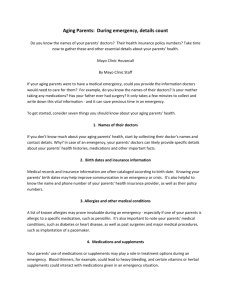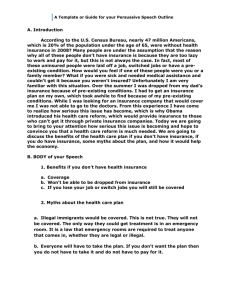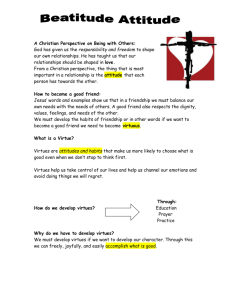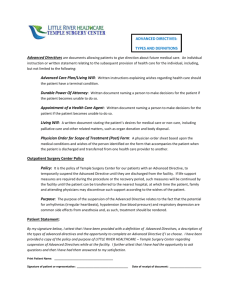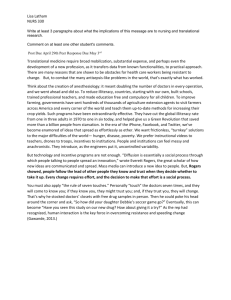PLC Submission to Law Reform Commission on Advance Care
advertisement
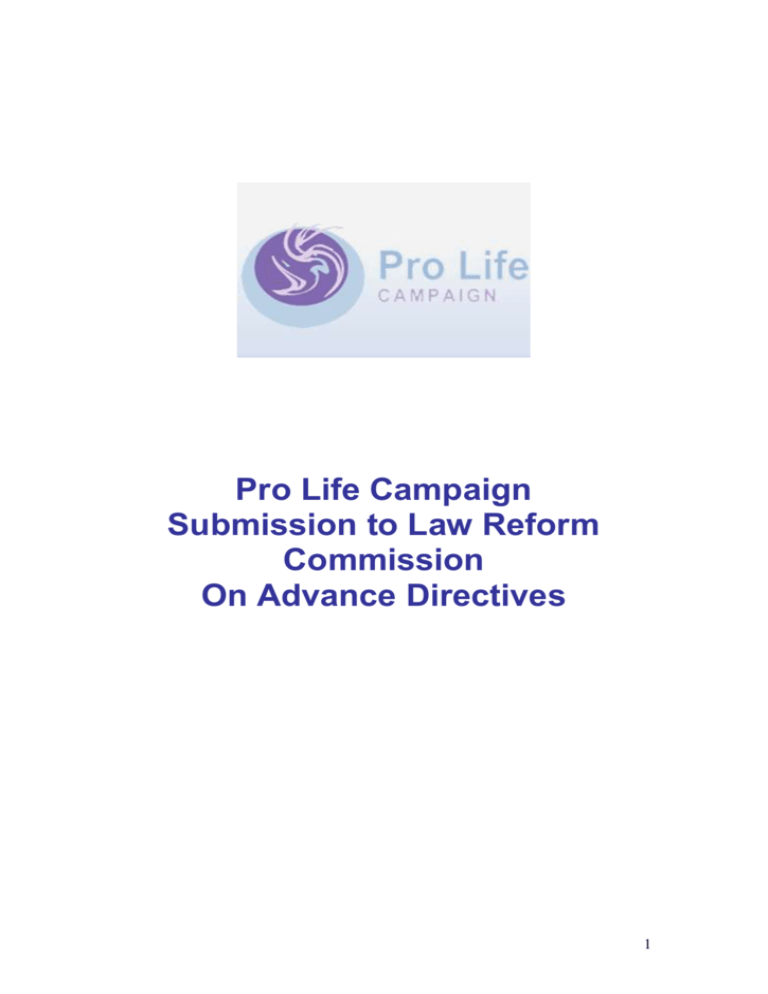
Pro Life Campaign Submission to Law Reform Commission On Advance Directives 1 Pro Life Campaign Submission to Law Reform Commission On Advance Directives January 2009 Introduction We welcome the opportunity to respond to the recent publication of the Consultation Paper of the Law Reform Commission on Advance Care Directives. The Paper gives doctors who are committed to protecting the lives of their patients the opportunity to re-affirm their commitment to the best possible care and the protection of the basic needs of their patients. It is a timely opportunity for doctors who have professional obligations of the most serious kind towards the weak and vulnerable to reaffirm their commitment. In the wake of the Ward of Court case1, doctors in Ireland made clear their commitment to protect the lives of those patients who had not the capacity to speak for themselves by making all reasonable and practical efforts to give nutrition and hydration to all patients.2 Doctors have shown their unwillingness to be agents of the State and affirmed their professional obligation towards patients, especially when their lives are threatened by actions of the State. We believe that it is important that those responsible for any legislation in this area give the Consultation Paper serious critical attention. We believe that the working paper seriously lacks a considered philosophical basis. Its presentation and analysis of the Ward of Court case, in which a vulnerable and dependent patient had food and nutrition withdrawn, is seriously flawed and remarkably superficial. The Ward of Court case permitted the basic and ordinary care of nutrition and hydration to be withdrawn from a vulnerable and dependent patient; someone whose life was the subject of a constitutional guarantee was not properly protected by the State when at her most vulnerable. The Commission does not allude to the serious protest implicit in the Medical Council’s decision that to fail a patient in this respect was professional misconduct. The Advance Directive and Contemporary Culture Charles Taylor, the Canadian philosopher, in his examination of contemporary western culture notes that it tends to give “a salient place to freedom and selfcontrol, places a high priority on avoiding suffering, and sees productive activity and family life as central to our well-being”.3 Taylor is right that family life and work are important in our understanding of the human good. However, it is also of crucial importance for a flourishing society that those who are unable to fully participate in society because of ill-health are given all that is 1 In re a Ward of Court (withholding medical treatment) (No. 2) (1996) 2 IR 79. See, for instance, Irish Medical Council, Statement of the Council after their statutory meeting on 4 th August 1995 (Dublin, 1995) 3 Charles Taylor, Sources Of The Self (Cambridge: Cambridge University Press, 1989) 14. 2 2 owed to them, including respect for the care and treatment which is their due. The practices and institutions of a society must ensure that justice is done for those whose health is seriously compromised. An advance directive is made for those times when we may not have the freedom to work out a response to our suffering. For that reason, there is the possibility that advance directives may offer a way in which to express the just concerns and needs of the sick, when they reach a point at which they can no longer make their voice heard. In this respect, advance directives, when well drafted and when respectful of our duties to protect human life and health, can give guidance to proxies and physicians. The appointment of a proxy who the patient trusts and who respects the inalienable basic human goods of the patient can help provide assurance for the patient. It is particularly important that the patient be assured that they will not be deprived of the basic needs of nutrition and hydration. The significant limitations of Advance Directives While advance directives are useful instruments, they have quite significant limitations. They come into force when the patient is no longer competent to make his or her views with respect to health care known. The Law Reform Commission Working Paper, in our view, seriously underestimates these significant drawbacks. Professor Emily Jackson has drawn attention to these shortcomings, particularly to the possibility of a lack of precision: “In practice, however, it is very unusual for patients to draw up advance directives which are precise enough to be legally binding. It is almost impossible to foresee every medical eventuality when making an advance directive, and any lack of fit between the advance refusal and the patient’s present circumstances leads to doubt about its validity, and medical staff will therefore feel justified in ignoring it. Because the patient is now incompetent, it may also be difficult to establish that she was actually competent when she made her decision. There is also always a risk that the patient may have changed her mind since making the advance directive”.4 This last point is significant. When we are in full health, we might dread the possibility of serious ill health; we might ask in a directive that we would not want treatment in the event of a particular condition. However, the will to live is strong and our perspective may change when ill health arises. An advance directive may hamper proper care. It is difficult to foresee all the contingencies which might arise. With respect to precision, while not ruling out the possibility of the validity of an advance directive, Professor Jackson points to a number of cases in which the specifications were insufficiently precise to be allowed to guide the Emily Jackson, Medical Law – Text, Cases and Materials (Oxford: Oxford University Press, 2006) 189. 4 3 doctors.5 The experience of advance directives in the United Kingdom suggests that there are good reasons for caution with respect to their usefulness. It seems to us imprudent to ignore the sufficient practical drawbacks which have arisen in other jurisdictions. There is no reason to believe that these difficulties would not occur in Ireland. They are not a panacea for difficulties which might arise in the care of those deemed incompetent at law. Professor Jackson draws attention to the fact that consultants in the NHS may not have the time to discuss possible scenarios with patients6. Given the demands on our own health service at this time, one can, with some justification, share her misgivings. This does not suggest that advance directives may not be useful in some cases. However, even with the aid of experienced lawyers and medical advice, there remains the possibility that advance directives may offer little. It may be that only those who are relatively wealthy and who can afford to consult doctors and lawyers with sufficient expertise to guide them find some usefulness in advance directives . This would seem to be an unsatisfactory position. It would put poorer patients at a significant disadvantage, and create serious inequality. Advance Directives and Medicine The social context - living longer than before Over the last hundred years or so, medical advances have contributed to an increasing life span for many people in the Western world. The quality of food and increased economic prosperity has also helped people in this regard. In 1800, life expectancy worldwide was around 30 years of age. Two hundred years later, in 2000, the average age was 67 years of age.7 There has been a doubling of the mean life expectancy in this period.8 Brown identifies six areas which have contributed to this development.9 Public Health – sanitation and vaccination Medicine – drugs such as antibiotics Economics – countries and people got richer Nutrition – reduced famine and malnutrition Behaviour – individual and family management of health Education – literacy and schooling The advances mean that our life expectancy continues to rise. Medicine is one significant cause amongst others which have contributed to our increasing life-span. It is not the only factor, although it is of crucial significance in increased longevity. 5 See HE v A Hospital NHS Trust (2003) EWHC 1017 (Fam) (2003) 2 FLR 408; W Healthcare NHS Trust V H (2004) EWCA Civ 1324. 6 Ibid, 935. 7 Guy Brown, The Living Death – the future of death, aging and immortality (London: Macmillan, 2008) 27. 8 See Christine Overall, Aging, Death and Human Longevity – A Philosophical Inquiry (University of California Press: Berkely, 2003) 9 Brown, supra, 31. 4 With advances in medicine, and the advances in nutrition and economic wellbeing, people tend to live much longer even with serious and chronic illnesses. In recent years, for example, even in the relatively short time since the condition was identified, the great amount of money invested in research into HIV and associated illnesses has enabled patients who are HIV positive to benefit from refinements of treatment such that their longevity has increased significantly. It does happen, from time to time, that issues arise as to how best to use particular medical treatments and technologies. This is a question of some complexity. In acting or omitting to act in the care and treatment of any patient, there are usually multiple factors. It may happen that a doctor or a medical team can overdo treatments with no benefit to the patient. Such may be the result of the doctor or medical team coming under pressure from a family or next of kin to continue treatment. Doctors may pursue the treatment with some reluctance, knowing reasonably well that no benefit will result for the patient. It is not clear how common this may be; it would be difficult to estimate. The problem should not be over-estimated either. It is not helpful to create unlikely scenarios and a climate of fear. It is clear that many patients choose to cease treatment which produces painful sideeffects with little or only negligible value. It is possible to say with some confidence that modern medicine in Ireland is increasingly precise in treating serious illnesses. Palliative care has also helped, with many areas of the country having established local hospices. In considering advance care directives, the Law Reform Commission note that they evolved as a response to the possibility of burdensome and futile medical treatment.10 This concern may be especially felt by those who fear that at some point in their lives for whatever reason they may not be able to articulate their wishes and concerns. They may fear the possibility of futile treatment. If there was a serious risk of this, it would be an area of legitimate and proper concern for patients. However, as already noted, it is important that patients in Ireland are aware of the reluctance of doctors to give futile treatment. Apart from the fact that knowingly futile treatment is generally a poor use of resources, and questions of justice for others arise through such misuse of resources, doctors in Ireland are generally more than aware of the fact that the sick and their families and next of kin are more and more inclined to engage with doctors in choosing appropriate care and treatment. Doctors, as a result, are actually in a better position than previously to advise on what is most beneficial and also ensure that the patient does not lack the basic needs of all human beings to appropriate nutrition and hydration. In the case of patients who are deemed incompetent, whether through a loss of previously functioning capacities or for other reasons, this may be more complex. Doctors however are no more inclined to insist on treatment which is 10 Law Reform Commission, Consultation Paper at paragraph 1.06 5 futile. The fears of such futile treatment are, thankfully, not well grounded generally. A serious and unfortunate shortcoming of the Law Reform Commission paper is the failure to distinguish between care and medical treatment. They do go together. But there does come a time when medicine recognizes that the illness of a particular patient has reached a stage when treatment is futile because of imminent death. It is important that patients are not frightened into making advance directives without due consideration of the possible risks inherent in such directives. Legislation should protect doctors so that they are not obliged to comply with patients who may have suicidal intentions, however rare this may be, as in deliberately excluding nutrition and hydration so as to hasten death. Such cases may be rare but their possibility exists. The Care of the Incompetent Our capacity to act follows on and is dependent on the question, ‘what is to be done?’, which indicates our capacity to wonder and to reflect on our experience and events in the world and to judge and discriminate between different possibilities before we choose to act. This reflection assists in our choosing to respect and to foster the goods which contribute to human flourishing, goods such as life, health, friendship, knowledge, practical reasonableness, play and religion.11 We have to cope with human limitation and human suffering. Despite the increase in human longevity which we have referred to above, human life remains mortal life. It will come to an end. Part of this process is a gradual breakdown in health and fitness. Just as we grow gradually, our decline is similar; it is something which happens over time. If a patient is no longer considered competent, and the diagnosis and prognosis point to the patient remaining in this condition, difficulties may well arise with respect to treatment. It may be that the patient is no longer capable of independent practical reason. Becoming Dependent The Course of Human Life and Virtues of the Care-Givers The loss of one’s independence and the ability to exercise practical reason is a situation that all might face. Even the most robust of us have no assurance that misfortune of some kind may not strike us, such that we become incapable of exercising independent practical reason. When ill health strikes, the question, ’what am I to do?’, is one which sick people ask themselves. It may be a question which others also have to consider in respect of the human being who is now vulnerable and dependent on others. 11 See, for instance, John Finnis, Natural Law and Natural Rights (Oxford: Oxford University Press, 1980). 6 Alasdair MacIntyre recently challenged contemporary moral philosophy to consider what is required in the face of the human dependency, fragility and vulnerability. MacIntyre suggests the need to develop ‘the virtues of ‘acknowledged dependence’’, virtues which are not given particular consideration by recent work in moral philosophy.12 These virtues are required so that the vulnerable and dependent must have their good recognized and cared for. D’Andrea suggests, following MacIntyre, that the good of the vulnerable and dependent is “a good inseparably linked, as the good of all other persons in the social order is, to the common good” 13 This approach is one which dovetails with the Irish Constitution, which emphasizes the common good, which we, as the people of Ireland, are asked to promote.14 The good of the individual patient, the good of the medical profession, and the good of proxies, all of these have to be respected, balanced and considered in the light of the common good. Central to the common good is the obligation of the state to defend the lives of the innocent. This is, in fact, key to the authority of the state. As Elizabeth Anscombe pointed out, if the State itself fails to defend the lives of the innocent or attacks them, “it nullifies the basis on which its use of violence is different from that of a gangster band”.15 On what basis can a state act to defend people against crime and disorder, and foreign invasion, if it also allows private citizens, such as doctors or others to take steps against innocent human life? The Constitution, our basic legal framework, understands the common good as something real. It is not a fantasy, something which is a mere amalgam of individual goods, but something real and substantial.16 Central to the promotion of the common good are practices which help foster respect for the human rights and fundamental basic human goods of its citizens. Thus, medicine plays its part. In terms of the practice of medicine, respect for the fundamental human good of life is its keystone. If respect for the fundamental good of human life is conditional upon the quality of a particular human life, there are good grounds for concern. Virtues which the proxies for the good of the dependent need include generosity, honesty, courage, temperateness; they are also required to respect the obligation never to take the life of an innocent human being and 12 See Alasdair MacIntyre, Dependent Rational Animals (London: Duckworth, 1998). Thomas D’Andrea, Tradition, Rationality and Virtue – The Thought of Alasdair MacIntyre (Ashgate, 2006) 381. 14 See Preamble to The Irish Constitution, for example, which sets out the common good as a telos for government and people. 15 G.E.M. Anscombe, “Murder and the Morality of Euthanasia”, Human Life, Action and Ethics (2006) (Exeter: Imprint Academic, 2006) 65. 16 See John M. Rist, Real Ethics – Rethinking the Foundations of Morality (Cambridge University Press, 2002) which contrasts the common good with an individualistic conception of the goods, in which society is understood as the enemy of individual freedom. The tradition which inspires Beauchamp and Childress, who are frequently cited by the Law Reform Commission, is one which is much more individualistic. 13 7 never to misrepresent the situation of another human being.17 Both of these rules are pivotal to caring for the sick, and particularly the dependent who are no longer capable themselves of articulating their concerns. For instance, misrepresenting the position of another human being in relation to health care preferences (e.g. that the patient did not want any treatment or care in the event of a particular condition) would be a very serious injustice. Similarly, acting to intentionally kill the life of an innocent patient, or omitting to act where the omission is intended to bring about the death of the patient, is a serious injustice. The virtues of acknowledged dependency and the rules which are required for the proper exercise of these virtues serve to protect the patient. Amongst the frequent philosophical references which the Law Reform Commission makes are to the work of Beauchamp and Childress, who see autonomy as the crucial issue. Their work does not take proper account of the fact that we are part of a community, that we flourish through the acquisition and exercise of virtues, that we need to respect certain rules and principles in order to flourish, and that we need to consider the common good in our choosing. The contrast between the Irish Constitution and the individualistic strain evident in the consultation paper is quite marked. Lacking an appreciation of the common good, the individualist sees social institutions “merely as means, as instruments, through which individuals may give expression to and achieve the various goals they have chosen”18 This anti-institutional view, one which may fail to appreciate the need for cooperative activity and the goods inherent to practices such as medicine, is not particularly helpful in coming to an appreciation of the art of medicine. By contrast, a view which appreciates the common good appreciates the need for virtues and rules which serve to protect and build up the common good. Part of the common good is care for the sick. In this respect, MacIntyre considers the possibility of misfortune:We need others to help us avoid encountering and falling victim to disabling conditions, but when, often inescapably, we do fall victim, either temporarily or permanently, to such conditions as those of blindness, deafness, crippling injury, debilitating disease, or psychological disorder, we need others to sustain us, to help us in obtaining needed, often scarce, resources, to help us discover what new ways forward there may be, and to stand in our place from time to time, doing on our behalf what we cannot do for ourselves. Disability is a matter of more or less, both in respect of degree of disability and in respect of the time periods in which we are disabled. And at different periods of our lives we find ourselves, often unpredictably, at very different points on that scales. When we pass from See D’Andrea, supra, 378; also Alasdair MacIntyre, Dependent Rational Animals (London: Duckworth, 1998) 112-115. 18 Alasdair MacIntyre, “Individual and social morality in Japan and the United States: Rival conceptions of the self”, Philosophy East and West 40/4 (1990) 489. 17 8 one such point to another we need others to recognize that we remain the same individuals that we were before making this or that transition”.19 He suggests that to properly flourish, we must avoid a calculated morality, in which we help others so that they, in their turn, will help us, “trading advantage for advantage”.20 Experience can teach about the place of independence and dependence on others in a flourishing life.21 Different virtues may be called for in different contexts. The classical virtues of justice, temperance, and courage are generally directed towards those times in our lives in which we are independent. He proposes that we need virtues which support and acknowledge dependence. He refers to the Lakota expression ‘wancantognaka’.22 It is a duty of justice and of the generous person. It is practiced by individuals who recognize their obligations towards others. Such an individual says: “ . Because I owe it, to fail to exhibit it is to fail in respect of justice; because what I owe is uncalculated giving, to fail to exhibit it is also to fail in respect of generosity”.23 It is through these dispositions and virtues that medicine, practiced in Ireland in the Hippocratic tradition and informed by the Judaeo-Christian ethos, has served us so well. To introduce a policy which might, even inadvertently, affect care for those who are weak and vulnerable, whether competent or not, would be to jeopardize all care. The introduction of a corrupt principle would affect the care. It would be to introduce a principle which is at odds with all that is best in care. In this regard, we note the failure of the Law Reform Commission to recommend a guarantee that nutrition and hydration would be secure for all patients. The Art of Medicine The art of medicine is something which, as the late American philosopher John Dolan remarked, has “a master aim”.24 This aim is the promotion and protection and where possible the renewal of our health. To introduce a practice which compromised this vocational aim, such as either the intentional killing of innocent patients, such as human embryos, or those in a permanent vegetative state, or those with particular forms of dementia, would be to violate and undermine this aim. Medicine is not “something invented a few months ago by a task force. . . . . it is rather, an institution which is one of the more remarkable cultural achievements of our species”.25 Its achievements are the work of centuries; the work of medicine means that the doctor has a professional obligation not to abuse the position of trust and power which the doctor has. Central to the 19 See MacIntyre, Dependent Rational Animals, 73-74. Ibid, 108. 21 Ibid, 113. 22 Ibid, 121. 23 Ibid, 121. 24 See John M. Dolan, “Is Physician Assisted Suicide Possible?” Duquesne Law Review 35 (1996) 355393, at 384. 25 Ibid, 389. 20 9 Hippocratic tradition and the Judaeo-Christian ethos which inform and inspire the ethos of the Irish medical system, this means an absolute respect for good of human life, an absolute prohibition on any sexual solicitation or sexual abuse of patients and a strict obligation of confidentiality. In closely defined circumstances, confidentiality may not apply. However, the obligation to protect human life is absolute. Actions and omissions which are intended to deliberately cause the death of patients are prohibited absolutely. Similarly, making sexual advances to patients, making indecent suggestions to them, undertaking inappropriate examinations and other such actions are a gross betrayal of the trust which is implicit in the doctor/patient relationship. Trust is central to the patient/doctor relationship. To introduce a practice, such as the failure to guarantee nutrition and hydration to dependent and vulnerable patients where practicable, would be extremely serious. John Dolan points out that the practice would harm medicine. It does not concern an individual patient alone. This is not how practices work. It would mean “the establishment of a new practice concerning the entire class of patient”.26 In terms of the consequences, it would “necessarily have consequences for a number of patients, including many not yet born”. 27 Its effect would be, he points out, to alter “the inner workings of the practice of medicine, thereby having consequences for patients outside the class it specifically mentions”.28 It would be foolhardy in the extreme to think that if Ireland was to introduce such a practice the result would be any different than to places like Oregon in which euthanasia is now part of medical practice. Recent social experience in Ireland gives much evidence that the support of law is required to protect fundamental human goods and institutions. Although the Law Reform Commission insist that the report has nothing to do with euthanasia, the manner in which it approached the Ward of Court case does give cause for concern. The Ward of Court case did demonstrate a pronounced bias to passive euthanasia, even if the Court insisted otherwise. The dissent of Mr. Justice Seamus Egan in this regard is noteworthy. Curiously, the report does not address his worries and concerns. A physician who, as Dolan says, is intent on saving someone’s life and concurrently “keeping an eye to the possibility that it might make better sense to kill” hardly has “head, eye and heart in one line of sight”. 29 It seems to us that any legislation which may be considered in relation to advance directives should not allow the master aim of medicine, which is to protect and guard human life and health, to be violated by anything which suggested a “confusion of tasks and potential conflicts ..”.30 For instance, any willingness by the law to permit doctors or other to decide on the quality of life of a Catherine F. Bontke, John M. Dolan, Cindy B. Inanhoe, “Controversies: Should we withhold food from patients in a persistent vegetative state?”, J. Head Trauma Rehabil. 9 1994 62-69 Ibid, 63. 27 Ibid, 63. 28 Ibid, 63. 29 Dolan, “Is Physician Assisted Suicide Possible”, supra, 387. 30 Ibid. 26 10 particular patient and on that basis decide that a particular life is not worth living is indicative of a serious problem. Thankfully, the Medical Council was quick to defend the rights of patients after the Ward of Court case. Its reminder of the professional obligations of the doctor towards vulnerable and dependent patients was a welcome demonstration that doctors were not willing to become agents of the state. The Ward of Court Case A lack of philosophical depth The basic facts of this tragic case are reasonably well known. At the age of twenty-two, the ward underwent a minor operation. During the operation, she suffered three cardiac arrests, and there was consequent loss of oxygen to the brain. Initial diagnosis revealed severe brain damage, and, despite some promising early indicators, as time went on it became clear that she would not recover. She had some cognitive functioning and was able, according to staff in the institution in which she was cared for, to recognise them. It was clear that she was not in a vegetative state. After some time in a hospice setting, her family decided to seek to have nutrition and hydration removed. It was the first time the Courts in Ireland dealt with this issue. The House of Lords had heard the Tony Bland case two years earlier, and it proved of significant persuasive force, the Irish Courts opting to follow Bland.31 The High Court and the Supreme Court both supported the removal of nutrition and hydration. The Law Reform Commission show little or no awareness of the serious criticism of the Supreme Court and High Court ruling in the Ward of Court case by commentators in Ireland and elsewhere. For instance, it makes no mention of the critique in the standard work on Irish Constitutional law. 32 In terms of care of the patient, of particular note in respect of cases such as the Ward of Court case are the remarks of Dr. Helga Kuhse who was involved in World Federation of Right to Die Societies. According to her, where people can be persuaded “to accept the removal of all treatment and care – especially the removal of food and fluids – they will see what a painful way this is to die, and then, in the patient’s best interests, they will accept the lethal injection”.33 Human rights expert Dr. Jacqueline Laing has expressed concern that this is “a form of homicide by omission, and sets up the mechanism by which routine lethal injection will inevitably become desirable”.34 31 Airedale N.H.S. Trust -v- Bland (1993) 2 WLR 316. 32 J. M. Kelly, The Irish Constitution (G.W. Hogan & G. F. Whyte) (Dublin: Lexis Nexus 2003) Cited in Dr. Jacqueline Laing, “Mental Capacity Bill – threat to the vulnerable”, New Law Journal, 30th July 2004, 1165. 34 Ibid, 1165. 33 11 As we said, the Commission failed to consider the serious misgivings voiced concerning this case. Hogan and Whyte note the paternalistic approach of the Court. This amounted to allowing a situation in which “the State, in appropriate circumstances and acting through the Courts, may authorize a course of action leading to the death of a ward of court”. 35 They reserve particular criticism for the judgment of Mr. Justice O’ Flaherty, who referred to the patient being alive but having no life at all. This, they feared, resulted in “a very crude and dangerous test for determining when it might be appropriate to authorize a course of action resulting in the patient’s death”36 No mention of the literature in this respect appeared in the Law Reform Commission Consultation Paper. John Keown, who has carried out studies of doctor induced death in many jurisdictions, has also drawn attention to the shortcomings of the decision. He said that the reasoning in the case was “distinctly lame”.37 He went on:“Given that, unlike Bland, the patient was not in pvs and the carers wished to continue feeding., it is remarkable that the majority seemed content to do little more than invoke cases such as Bland and supplement them with incantations of ‘privacy’ , ‘dignity’, ‘bodily integrity’ and ‘autonomy’. A rigorous analysis of these concepts, and the duty to feed those in one’s care, is notable by its absence”.38 No reference to these criticisms is evident in the Consultation Paper. In this respect, it falls far short of what one might expect from a detailed investigation of the issues. Similar shortcomings are evident in the philosophical approach in the Consultation Paper. In this regard, we note that the Law Reform Commission refers to “patient autonomy as the paramount principle in bioethics”.39 A report on advance care directives will inevitably make some references to philosophical and ethical principles, often in a very compact form with little explanation. One might make a more robust and powerful argument for such a claim in an academic journal than might be found in this report. 40 Nonetheless, the assertion that patient autonomy is “the paramount principle in bioethics” does require much fuller exposition and justification than is given here. The assertion needs to take account of the complexity of how we engage in practical reason. Onora O’ Neill has explained how bioethics is not “a free floating discipline: there is no way of justifying principles and standards by fiat or by 35 John M. Kelly, The Irish Constitution (G Hogan & G Whyte) (Dublin: Lexis Nexus 2003) 1400. Ibid, 1400, footnote 61. 37 John Keown, “Life and Death in Dublin”, The Cambridge Law Journal (1996) CLJ 6-8, at 6. 38 Ibid, 7. 39 Consultation Paper, Paragraph 1.06. 40 See Paul Weithman, “Of Assisted Suicide and ‘The Philosopher’s Brief’”, Ethics 109 (1999) 548579, at 549, who examines the brief submitted by six prominent philosophers to the American Supreme Court in a case which concerned assisted suicide, and makes this precise point with respect to their Amici brief. 36 12 proclamation”.41 Such an approach risked offering only “a quick and lazy ‘justification’”. Our concern is that the report lacks a proper, thought out response on the matter of patient autonomy. It is not clear, for instance, that the report comes to grips with a conception of autonomy which understands it as the right of an agent to do whatever he or she may want to do. Undoubtedly patient autonomy is an important consideration in medical care and treatment. Generally speaking, it is the patient who exercises this autonomy by going to the doctor, by advising the doctor of symptoms, by discussing possible remedies with the doctors involved in her care and treatment, by following, or not, the advice and direction of the doctor as to a particular ailment’s cause and possible remedy. Autonomy is something exercised in the context of our living in a community and something which is prepared to be guided by the truth and insights which others offer. A notion of autonomy which overlooks the fact that as human persons we live for and with each other is not particularly helpful as a model to guide consideration of any legislative policy. We would respectfully point to the earlier cases which were not considered by the Supreme Court in Ward. These concern a duty of care for dependent and vulnerable people. An example of such a case is King v. Gibbins and Proctor, which concerns a child starved to death by her guardians.42 According to the court, the duty to look after the dependent, such as a young child, was so clear and self-evident that it did not require analysis or authority. As John Finnis said of such cases:“They establish that someone who undertakes the charge or duty of caring for a dependent person, for example a young child, and omits to supply the necessary food or clothing with the intention of causing death or serious bodily injury is guilty of murder”.43 It is on that basis that legislative and judicial policy should protect those deemed incompetent at law. This approach of care for the vulnerable is at the heart of the Hippocratic tradition, which, with the Judaeo-Christian ethos, informs all that is best in our health institutions. To fail to supply the necessary sustenance to a patient on the basis that the quality of life is somehow not worthy of a human being is to set off on a dangerous path. Onora O’ Neill, Autonomy and Trust in Bioethics (Cambridge: Cambridge University Press, 2001) 76. 42 See R V Gibbins & Proctor, 1918 CCA 43 John M. Finnis, “The Legal Implications of the Bland Judgment”, http://www.donoharm.org.uk/alert/tonybland/ accessed January, 2009. 41 13
